06.30.16
Posted in Europe, Patents at 5:07 pm by Dr. Roy Schestowitz
The Organisation’s latest meetup has been more of the same, i.e. a great disappointment

In the words of Board 28 (leaked document)
Summary: The EPO “crisis” — as Board 28 called it — lingers on because no substantial steps were taken towards Battistelli’s removal from Office for his violation of Office rules (his own rules) among other laws that Eponia perceives itself as exempt from
MANAGEMENT of the EPO (Office) continues to control the Organisation (the other EPO), which doesn’t seem to care about abuses of the law, human rights abuses, subversion of justice and so forth. Intuitively enough it means that the Organisation is somewhat complicit in the whole thing (see our previous post on this matter).
One new comment says that “it does turn out that there were hefty discussions throughout the day, with a particular emphasis over DG3 matters. The overarching Presidential powers were actually put into question. B28 [Board 28, which admitted there's a crisis] should be busy “squaring the circle” throughout the night and prepare revised documents. Whether they can deliver under such pressure acceptable texts remains to be seen. These should also withstand scrutiny after been adopted in the hectic atmosphere of the AC.” [Administrative Council]
“Today the members of the AC disgraced themselves,” another person wrote. “First they granted Benoit Battistelli impunity for his obstruction to justice and then they approved his disastrous reform of the Boards. We can play a requiem for the independent judiciary review of the EPO decisions. Shame on the members of the Council!”
Here is something that a random EPO worker wished to tell us following our publication of some text read out loud at the meeting (the word is spreading out fast and Techrights is under very heavy load tonight — to the point of becoming inaccessible at times):
It’s a very sad day in the history of the EPO, the entire staff and the democracy in Europe in general! Today I’m so ashamed to hold a European nationality, however I will fight them till my very last breath of air. What Battistelli and his thugs did to Laurent Prunier, Els, Ion and all the other staff reps and staff members, it beggars description. Let’s wait and see if we can achieve something through the national court(s). I’m afraid that this will be SUEPO’s last option in this desperate fight. Poor Laurent, it breaks my heart to see him suffer. He is one of the most competent and intelligent persons I know. That said, here is some more additional insider info…
All delegations find the increase in production figures great, the reduction of sick leave great (despite the fact that none of them can ascertain that the figures from VP1 are not fake ones; they also have no idea how bad currently are sick colleagues “dealt with” to achieve such questionable figures).
Delegations stress that quality is important (hahahahaha) and find that the social climate is not at his best (arghhhhhhh); Delegations await with great excitement the results of the “social study” and Oshra (we remind you that for both exercises your staff reps were not genuinely associated); the President is confident that the results will be fine (sighs; sobs)
The DG3 reform does not fly as presented and must be discussed further; Battistelli is happy to have signed a MoU with a union representing 1% of staff and accuses SUEPO of organising a public campaign against him.
No revision of the disciplinary sanctions for Ion and Malika, only an insufficient one for Els (he cancelled the reduction of her pension but she remains fired, no one complains).
Your central Staff Committee representatives remind the AC delegations of the worrying results regarding quality obtained via the Technologia survey, the (too) high pressure for staff, the undue sanctions on staff reps not revised, the 20 demonstrations organised so far, the strike with 2700 members etc. No comment nor question from any delegation.
A lot of the claims from EPO management are lies, including the claims about production. We wrote about this before and various insiders tell us the same thing. The EPO’s management has a well-documented record of lying to staff, to journalists and so on. The integrity of the EPO as a whole (including the Organisation) is rapidly descending to zero and the delegates (part of the Organisation) do not seem to mind. They don’t care enough to actually take action. What an historic coup. Benoît Battistelli may be to the Organisation and the EPC what Nigel Farage is to the European Union and the Lisbon Treaty. They have secured their names in history books, but primarily as villians. █
Permalink
 Send this to a friend
Send this to a friend
Posted in Europe, Patents at 4:50 pm by Dr. Roy Schestowitz
Not criminals are punished but those who report the crimes or merely mention the crimes

The notion of justice at today’s EPO is about as farcical as the above (if not a lot worse for numerous reasons)
Summary: By implicitly declaring a war on those who speak truth to power or those who are associated with perceived truth-tellers, Battistelli reinforces the perception that he is protecting the bad people at all cost (even his very own career)
WHAT apparently began with an attack on a truth-telling judge has developed into an Office-wide (if not Organisation-wide) crisis. Putting Željko Topić in a position of power was a terrible mistake all along and right now Battistelli just wages a war on truth itself. By doing so Battistelli made himself — not Željko Topić — enemy number one at the Office. “Apparently,” one person told us, “SUEPO has a post-Battistelli exit party fund [...] this is extremely “end game” now…”
SUEPO representatives have come under incredible attacks for well over a year now. They’re being attacked for basically informing staff (not just members) and explaining to them the situation. As an example of the baselessness of the attacks (with alleged fabrications by Team Battistelli), consider the attacks on SUEPO's Prunier at The Hague. This SUEPO representative, who is banned from the EPO‘s premises (i.e. guilty until/unless proven innocent), should be cause for alarm in all EPO sites. SUEPO published its text about Prunier at SUEPO’s own Web site this morning (in RSS form only) and SUEPO has just provided an English translation of the article from NRC [PDF] (also in other languages) because it shows to what lengths Team Battistelli goes to prevent lawsuits against the Office (i.e. itself). The Techrights translation of the article helped show a barracks mentality in today’s EPO, one that defames perceived enemies and tries to destroy their lives with bogus ‘trials’. “Regarding my question (not opinion) about the closure of the disciplinary case,” one person wrote today about the judge: “Isn’t it so that a decision has been taken, that is, NOT to propose dismissal? That is a decision, on whatever grounds, substantive or not. There are plenty cases outside the EPO where a decision was taken on procedural grounds and it is not possible to reopen the case once a final decision has been taken, regardless if that was done on procedural or on substantive grounds. And yes, by taking this decision the member remains in limbo because there is nothing foreseen to reinstate him. What an incredible mess.”
Another person wrote about the case in relation to the external appeals process:
The EPO president is used to face the weak Administrative Tribunal of the ILO.
The ILOAT never organises Oral proceedings. There are no witnesses, no facts finding. The procedure is all but transparent. The file is not public then the Tribunal can easily modify the facts and hide the evidence brought by the staff members. Also, the Tribunal trust the EPO – No need to bring evidence for the EPO.
If the Office explains that the investigation found that Mr X did something wrong. The Tribunal will repeat that the investigation proved that Mr X did that thing wrong.
For the Tribunal, the EPO is a fair organisation that never lie. That’s why the Tribunal never put in doubt the explanations given by the EPO.
The EPO wins 95 % of the cases in front of the ILOAT.
When the EPO is in front of a real justice, then usually it looses the cases.
For example, in front of a Dutch Tribunal or now in front of the Enlarged Board of Appeal.
“Very very sad,” one person told us about this, “but that’s exactly the way ILOAT operates. This causes an extremity of misery amongst the parties concerned” (not just judges but also representatives and those whom they represent).
Right now there is a campaign of terror at the EPO. It’s being waged by a deluded President whose termination seems to be only a matter of time. He did this to himself. █
Permalink
 Send this to a friend
Send this to a friend
Posted in Europe, Patents at 4:12 pm by Dr. Roy Schestowitz
Summary: An intervention by an EPO Central Staff Committee (CSC) member who is under gag orders from Battistelli’s regime and cannot speak about his case, which apparently involves truly severe disciplinary actions for merely helping or contributing to a staff survey (not controlled by and paid for by Battistelli)
“Unfortunately not a lot of information [is] leaking,” told us one source about this week’s secret meeting which helps determine the
EPO‘s future. “Here is what I got,” this source told us, “get your own idea!”
“Jesus Areso who is a CSC representative was in the AC [Administrative Council] meeting today,” we got told. “The text is in German. After the sexy presentation by Battistelli of his “social report for 2015″ Jesus Areso [whose personal story we mentioned here before], CSC representative attending the Council meetings for The Hague, made the following intervention:
Personalausschuß (JA): Ich weiß, daß wir es eilig haben. Aber als Personalvertreter benötigen wir fünf Minuten von Ihrer Zeit. Wir wissen zu schätzen, daß das Dokument umfangreich ist. Wir müssen auch die Trends betrachten und anschauen, was nicht im Bericht steht. Es gibt 77 weniger Bedienstete. 15 Mitglieder weniger in den Beschwerdekammern ist ein enormer Rückgang. In den Geschlechterunterschieden können Sie feststellen, daß 1/3 Frauen sind. Wenn Sie aber die höchsten Besoldungsgruppen anschauen, sehen Sie, daß nur eine Frau von sechs Personen bei den Beförderungen dabei ist. Eine Frau von zehn Personen wird in die höchste Stellengruppe gesetzt. Dies ist im 21. Jahrhundert nicht in Ordnung. Es gibt 20 % mehr Bewerbungen. Einstellungen sind um 34 % gesunken. Wir haben niemand aus Slowenien, Tschechien, Norwegen, der Schweiz etc. niemanden mehr eingestellt. Die Anzahl der britischen Kollegen sinkt dramatisch. 100 Kollegen sind 2014 in Rente gegangen. 2015 waren des doppelt so viele. Jetzt ist das Durchschnittspensionsalter bei 61,1 im Gegensatz zu 63 Jahren vorher. Bei den internen Beschwerden wurde nur 1 % zugelassen. Es ist kein Wunder, daß die VGIAO-Beschwerden gestiegen sind. Aspekte der sozialen Situation sind gar nicht im Bericht. Wir verweisen dafür auf den Technologia-Bericht. Das Vertrauen in den Präsidenten ist 0 %, 11 % des Personals als psychische Risiken. Die soziale Situation wird in den Zeitungen immer wieder erwähnt. In 2015 wurden Elisabeth Hardon und Ion Brumme entlassen. Das Sekretariat wurde gekürzt. Trotz Ihrer Resolution hat Herr Battistelli Disziplinarverfahren gegen Herrn Prunier eingeleitet. Ein weiterer Personalvertreter aus Berlin wurde entlassen. Wann hört dies endlich auf. Die Resolution aus März war schon ein Schritt in die richtige Richtung. Wir fordern den Rat auf, diese Entschließung auch umzusetzen.
“Guess what,” said our source, “neither a single comment nor a single question from a single delegation.” They must be afraid of the crazed Battistelli, who has already bullied some of them.
Here is an English translation: (using Google Translation)
Staff Committee (YES):
I know that we are in a hurry. But as a personal representative we need five minutes from your time. We appreciate that the document is extensive.
We need to look and see and not in the report, the trends. There are 77 fewer staff. 15 members less in the boards is a huge decline.
In the gender differences you may notice that 1/3 women. But if you look at the top grades, you will see that only one woman in six people in the transport is.
One woman out of ten is placed in the highest position group. This is not in order in the 21st century. There are 20% more applications. Settings have fallen by 34%.
We have no one from Slovenia, Czech Republic, Norway, Switzerland, etc. set anyone. The number of British colleagues drops dramatically. 100 colleagues have retired, 2014.
2015 were of twice as many. Now, the average retirement age is 61.1, as opposed to 63 years ago. The internal complaints only 1% was approved.
It is no wonder that the VGIAO complaints have risen. Aspects of the social situation are not in the report. We refer it to the Technologia report.
Confidence in the president is 0%, 11% of the staff as a mental risks. The social situation is repeatedly mentioned in the newspapers.
In 2015 Elizabeth Hardon and ion Brumme were dismissed. The Secretariat has been shortened. Despite your Resolution Mr Battistelli has initiated disciplinary proceedings against Mr. Prunier.
Another staff representatives from Berlin was dismissed. When this finally stop. The resolution of March was a step in the right direction. We urge the Council to also implement this resolution.
If someone has any more information (not necessarily minutes or reports) or has heard anything whatsoever about the meeting of the EPO and the Organisation’s Administrative Council, please get in touch so that we can inform people. Transparency is crucial for accountability. Battistelli prefers secrecy as it helps hide or spread uncertainty about his abuses (making it harder for reporters to write about these abuses). █
Permalink
 Send this to a friend
Send this to a friend
Posted in Europe, Patents at 3:25 pm by Dr. Roy Schestowitz
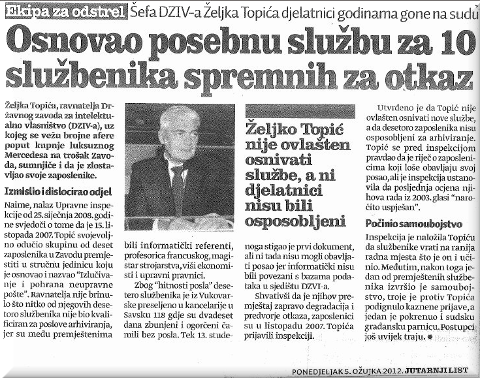
Summary: Cases against Željko Topić, a Vice-President at the European Patent Office, are moving forward in Croatia, where he still faces many criminal charges
Updates from Croatia occasionally reach us from various sources. The Vice-President that Battistelli uses for intimidation of staff is still facing many criminal charges and also civil lawsuits in Croatia — a fact that apparently is unspeakable. To inform delegates regarding such matters is not OK; when a woman from Croatia wrote to Croatian politicians about it she got sued for defamation but won the case repeatedly, lending legitimacy to her claims and leaving the accuser rather bashful.
What triggered many of today’s abuses against staff representatives at the EPO is this story (directly and indirectly), so it cannot be ignored. Željko Topić should be discussed widely at all levels of the EPO. As usual, as the EPO lies both to staff and to journalists, lies about Željko Topić come from EPO management, i.e. Team Battistelli. They have zero credibility on the subject. Rather than get rid of this liability Battistelli is believed to be trying to keep it around even longer.
“Delegates would have their own careers jeopardised if the EPO became virtually synonymous with “organised crime” and its Vice-President sent to prison.”Justice in Croatia may be notoriously slow (and favourable to the party with deeper pockets), but sooner or later the public will find out what happened and be sufficiently equipped to examine/judge the evidence. Topić refuses to attend trials (same arrogance demonstrated by Battistelli and Willy Minnoye who snub high courts in The Hague), but proceedings become publicly accessible. As an update about the civil lawsuit reported on Techrights, consider information we have received from Croatia. The lawsuit “which is being conducted by SIPO employees in relation to allegedly abusive behaviour by the management in 2007,” a source told us, is still ongoing and important news is just a fortnight away. “According to a reliable source a further court hearing took place on the 16th of June,” we learned. “The last court hearing is scheduled for the 13th of July and after that it is expected that the court will deliver its verdict.”
We shall keep readers updated on the matter. Delegates too deserve to know the background of Željko Topić (most of them probably know something about it, but not the very latest developments). Delegates would have their own careers jeopardised if the EPO became virtually synonymous with “organised crime” and its Vice-President sent to prison. █
Permalink
 Send this to a friend
Send this to a friend
Posted in Europe, Patents at 3:02 pm by Dr. Roy Schestowitz
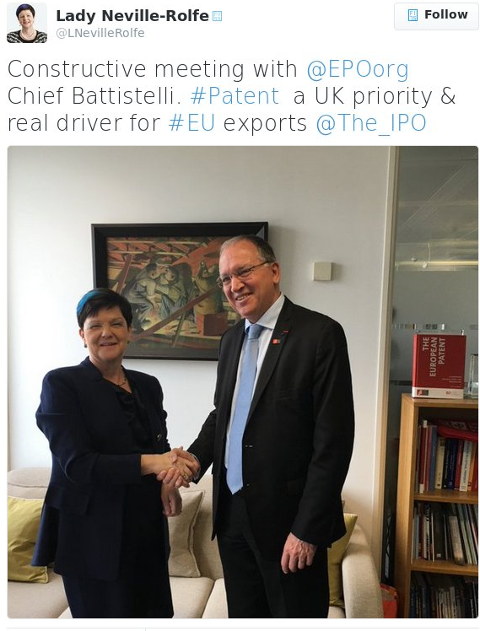
Summary: The UPC appears to be a dead end, much like Battistelli’s career, not only in the UK but in Europe as a whole (it has been all along designed with London/England/UK in mind)
LAST night’s post about the UPC (second that day about the UPC and tenth among eleven about the EPO) showed that even proponents of the UPC were more or less giving up. It’s just too much of a mess right now, as they too admit.
This morning we found several dozens of so-called ‘analyses’ of ‘Brexit’ [1, 2, 3, 4, 5, 6, 7, 8, 9, 10, 11, 12, 13, 14, 15, 16, 17, 18, 19, 20, 21, 22, 23, 24, 25, 26, 27, 28]. These came from law firms for the most part and they helped highlight the fact that ‘IP’ firms are truly in a panic over ‘Brexit’. Also see the many comments in IP Kat these days. Total panic. It’s not just them who are in panic (see this for example) and the question of patents isn’t even on top of the list of worries (nationally and EU-wide). The only upside here, as far as Techrights is concerned, is the demise of the UPC, which threatened to bring software patents to Europe (among other things).
“The legacy of EU harmonisation,” as IP Kat called it today, may be a dead legacy of patent harmonisation (“harmonisation” is how they used to market UPC almost a decade ago, well before it was even called “unitary”). This may actually be beneficial to Europe as a whole because, as one comment put it earlier today: “It is highly irresponsible and opportunistic to come up with such a unrealistic proposal. This once again amounts to pure lobbyism from the patent profession. The whole system is moreover not worth saving it. It’s whole architecture is full of deficiencies and the system is intrinsically unattractive for SMEs contrary to what is propagated by the Commission and the EPO.”
They must be alluding to proposals like that which came from Prof. Tilmann.
Battistelli’s special friend Baroness Neville-Rolfe has apparently just reinforced the great uncertainty surrounding the UPC because in her own words: “I know that many of you will be particularly concerned about the potential implications of the Referendum result for the Unitary Patent and the Unified Patent Court. Again, I am afraid that there is not much I can say at this stage. As you will know, we will have a new Prime Minister in early September who will need to take key decisions on our overall approach to negotiations on trade with the EU.”
“You may be interested in this speech,” one person noted, “delivered yesterday [...] “Baroness Neville-Rolfe addresses the British group of the Union of European Practitioners in Intellectual Property” [i.e. preaching to the choir]” (Neville-Rolfe has a reputation for this). █
Update: MIP now has a report about this too. It says (behind paywall): “Baroness Neville-Rolfe has said that the UK’s position on the UPC and Unitary Patent system will not be known anytime soon. The Minister has also invited UK stakeholders to be involved in the discussions which will lead to a decision” (in other words, she seemingly urges the conspiracy of lawyers to just carry on).
Permalink
 Send this to a friend
Send this to a friend
Posted in Europe, Patents at 2:26 pm by Dr. Roy Schestowitz
What purpose is left for Battistelli at the EPO then?
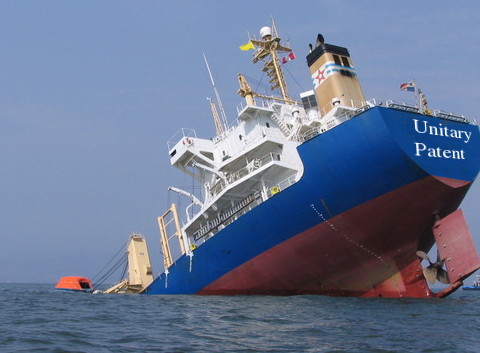
Summary: The UPC continues to sink as more and more people come to grips with the complexity of the current situation, irrespective of what countries other than the UK do next
THE existential risk to the EPO (devaluation of patents) is no joking matter. It would severely harm Europe, more so than ‘Brexit’ has harmed Britain so far. One danger to the EPO is actually the UPC, which older rumours said Battistelli planned to jump ship to/for (moving to the UPC regime once it is created).
“Brexit Won’t Affect Current Patent Cases, But It Might Kill European Patent Court Plans” says one of the biggest publications for lawyers at Law.com. This headline is followed by the paragraph that reads: “The United Kingdom’s Brexit vote won’t disrupt current patent practice in Europe, practitioners said Friday, but it will surely cause further delays—and possibly even kill—plans for a unified European patent court.”
This basically agrees with what we have been saying for quite some time. In a sponsored “article” (they euphemistically call it “REPORT”) for the EPO/FTI Consulting-sponsored IAM there is UPC ‘damage control’ today. It comes from NLO, i.e. a bunch of lawyers from a self-serving firm. One must remember that the EPO itself foresaw the crisis in case 'Brexit' happens; what’s the point suddenly denying/downplaying the severity of the situation? Earlier today IP Kat wrote: “The Unitary Patent has been many years in the making, and its future is still not entirely clear. Dr. Ingve Björn Stjerna has published a series of papers on the subject, all of which are available to read along with links to other useful resources here. IPKat readers in particular may be interested in the “expert teams” of the Preparatory Committee, and the immediate implications for SMEs.”
“Basically, no simply resolution exists right now.”As Benjamin Henrion has just put it: “for the UPC, the ECJ stated it is not open to non-EU members.”
Jesper Lund added: “In the unlikely event CJEU will allow this, the post-Brexit UK would be subject to EU patent law and CJEU as highest court, right?”
Basically, no simply resolution exists right now. It’s more of a mess than it has ever been and it can take years for anything significant to happen (if it ever happens at all). People in IP Kat comments currently joke that the only way for the UPC to survive right now is for some large city in continental/central Europe to instantaneously rename itself “London”.
Earlier today one particular comment noted that “amending the UPCA to enable a Non-MS-UK to be part of the UPC would be anything but a simple task.”
To quote the whole comment:
Just had a flick through the UPCA and it strikes me as rather clear that amending the UPCA to enable a Non-MS-UK to be part of the UPC would be anything but a simple task. For example:
Art. 1: …”The Unified Patent Court shall be a court common to the Contracting Member States and thus subject to –> the same obligations under Union law as any national court of the Contracting Member State — ” (emphasis added).
Art. 5: Contractual liability of the court is largely governed by EU regulations
Art. 23: Reference to Art. 258, 259 and 260 TFEU
Art. 31: International jurisdiction to be established in accordance with Regulation 1215/2015 or the Lugano convention
Also, I note that whether or not the UPC will go live as planned in 2017 not only depends on whether the UK ratifies, but also on France’s and Germany’s ratification. Why should those two burden the already complicated Brexit-negotiations with additional issues and potentially give the UK extra leverage?
Here is another comment on the subject:
Before even bothering to try to wrap my mind around the legal complexities involved here, I’ll just say something: it is politically impossible. No British Parliament is going to ratify yet another European agreement, in the current mayhem, with MPs throwing things at each other and both parties effectively leaderless. And even when they regain some appearance of calm (if they ever do), they’ll have to deal with a lot many far more pressing concerns than the UPCA: not just trade, but also the millions of EU citizens in Britain and Britain citizens in the EU, their access to benefits and healthcare, and their pensions.
Not to mention the fact that this vote has whetted the appetite of quite a few other populists across the continent who dream to wreck the whole European project.
So, and I say this as somebody who has himself invested also quite a lot of time and effort in preparing for the UPC: Forget it. It’s over. This parrot is dead. It’s an ex-parrot. I hope that, some time in the future, maybe in less than yet another forty years, there’ll be a unified European (or EU) patent system. Maybe even, without the Cameron team’s fear of the CJEU, it will have a simpler, more rational legal structure than the UPC came to have. But for the moment, I’ll be happy if the EU still exists by 2020.
It seems as though Unitary Patent (and its predecessors) is a dead/dying project, based on what even some insiders who stand to gain from UPC publicly say. They should know this better than most people as it’s them who paved the way to the UPC, typically behind closed doors (or in very exclusive, seclusive and expensive meetings).
“EU software patents via the UPC,” as Henrion noted today, is a very big threat, but seems as though even patent lawyers are pretty much giving up on the UPC, rationally thinking that no ‘fix’ is possible amid ‘Brexit’. Joeri Beetz, whom we mentioned here before, published an article titled “Why a leaving UK will never join the UPC”. To quote:
For the greater part, all communication tells me more or less the same. The European Patent Office (EPO) is not an EU organization. British patent attorneys will continue to be able to represent their clients at the EPO and granted European patent applications can still be validated in the UK. When it comes to the future of the eagerly awaited, however not yet existing, pan-European Unitary Patent and Unified Patent Court (UPC), the communication becomes less clear. And for good reasons. No one really knows what is going to happen.
Still, when reading through all the articles that reached my various display screens, I was a little bit surprised by how many European IP professionals consider it a serious option for the Unitary Patent and the UPC to start before the UK actually leaves the EU and with the UK as a temporarily participating member state. Some of them (e.g. this article by the prominent Dutch IP Lawyer Wouter Pors) even went so far as to suggest that it might be possible that the UK would continue to participate in the UPC after having left the EU.
Earlier today we wrote about very long discussions regarding this sensitive matter. It was about trying to bring back the UPC, albeit every discussion was full of pro-UPC people, i.e. probably a bunch of discussions from those who would gain from it (if it ever became a reality at all). Now comes an antagonist to the echo chamber and says: “Stop, stop, stop, all of you, please stop. [...] It’s over. I repeat, it’s over.”
Here is the comment in full:
Stop, stop, stop, all of you, please stop.
It’s over. I repeat, it’s over. The conversations in the legal community over the course of the last few days, in which lawyers are desperately trying to put sticky tape on the house of cards to prevent it from falling down, are not going to work.
Any system has to be palatable to industry, whether telecoms, mechanical, automotive, pharma, or SME. Even before Brexit, the whole thing was looking a bit wobbly (and hence creative lawyers were licking their lips for working out ingenious ways in which the system could be gamed).
But now, forget it.
Having mentioned Tilmann this morning, it’s back again and he’s everywhere in the discussions. Tilmann’s UPC fantasies (he is one of the core people pushing for it, for personal gain obviously) are brought up again as follows:
This proposal from Prof. Tilmann may be reflective of what is going wrong in th EU, and why the situation is now as it is. There was a democratic decision by the UK to leave the EU. It was narrow, it was not to everybody’s taste (also not mine, to be clear) – but it was a democratic decision that the UK should distance itself from the EU. We have to respect this decision, or else we would jeopardise our democratic fundament.
Now advocating that the UK should nevertheless ratify an agreement which would connect it with the EU does not appear to be appropriate. It appears to be an attempt to undermine the result of the referendum.
As far as I remember, nobody ever made similar suggestions to enable the participation of other non-EU countries like, say, Norway or Switzerland. I thought there were good reasons for that (CJECU opinion 1/09). Suddenly, all this does not appear to be valid any longer? This does not sound convincing.
In my personal view, the UPC without the UK would be much less valuable. Therefore, the UPC should now be revised to reflect the new scenario. I fully understand the disappointment of all people who spent huge efforts to establish this agreement, but this is not a valid reason to disregard the outcome of a democratic referendum.
“A quite interesting and imaginative intellectual exercise by Prof. Tilmann,” wrote this person in response, “an exercise inspired by his restless efforts to promote the unitary patent system. But it seems to be far from reality. Leaving aside the objections derived from the ECJ’s conditions in its opinion G 1/09 for a Court competent to decide on EU law, Mr Juncker and Mrs Merkel have made it quite clear yesterday that there will be no cherry picking for the UK and that negotiations on the relations EU – UK have to take place after implementing the BREXIT.”
“Prof. Tilmann cannot be taken seriously,” explains another person, as “his “expert” statements usually do nothing more than serving his very own interests, as some commentators have quite rightly indicated.”
Here is the full comment:
I am very sorry, but Prof. Tilmann cannot be taken seriously, his “expert” statements usually do nothing more than serving his very own interests, as some commentators have quite rightly indicated.
Readers may wish to have a look at Prof. Tilmann’s past writings on opinion 1/09, some are freely avalable on the internet (e. g. EUCJ – Opinion 01/09 – Analysis and Consequences, www.eplawpatentblog.com/eplaw/2011/04/eucj-opinion-0109-analysis-and-consequences.html). Studying paragraphs 14, 15, 19, 22, 23 of said paper is very enlightening, also Prof. Tilmann’s conclusions (paras. 24 and 25):
“24. This leads me to the following result of my Analysis: If the Agreement would be
concluded by EU Member States only and if the two “sanctions” would be expressly regulated in the Agreement, the Court would not have objections against the centralised Patent Court (PC).
25. Therefore, I advocate that the Opinion of the EUCJ be adopted to the fullest
extent and accordingly that the draft Agreement be amended in the following respects:
a) restricting the membership of the Agreement to the EU Member States willing to participate in the Enhanced Cooperation on the Unitary Patent and (…)”
So is it only my understanding that Prof. Tilmann was in fact saying in his analysis of opinion 1/09 that participation in the UPCA should be limited to EU member states only?
To the informed observer, Prof. Tilmann’s remarkable flexibilty in his positions on the UP/UPC issues is nothing new, he has repeatedly morphed in line with what was required to realize the project:
In the context of former Art. 6 to 8 of the Patent Regulation, some may remember that Prof. Tilmann first argued that the articles could not be removed without putting at risk Art. 118(1) TFEU as the Regulation’s legal basis. Later, after the European Council had demanded the removal of these articles, he suddenly advocated for the exact opposite of his initial position, namely that a removal was perfectly legal and would not endanger the legal basis at all.
Some may also recollect that he held the position that the opt-out of an eligible patent from the jurisdiction of the UPC would leave the application of the UPCA unaffected, i. e. a national court dealing with an opted-out patent would have to apply the UPCA in the national proceedings. This even led the Preparatory Committee to issue a statement that it did not share this position (www.unified-patent-court.org/news/interpretative-note-%E2%80%93-consequences-application-article-83-upca).
Therefore, Prof. Tilmann’s statements should certainly be taken with nothing but a grain of salt.
Still focusing on Tilmann’s role in the whole UPC project:
Professor Tilmann’s paper is certainly interesting and he may (or may not) be correct in his proposition that the UK can be part of the UP and UPC.
However, as already stated, even if this could happen it should not happen.
I suspect that even staunch supporters of Remain (including myself) would agree that a problem with the EU is that it has (by stealth?) over the years moved from an economic union towards a political union. Consequently I assume that many Remainers object to laws originating from the EU Commission having effect in the UK and even they would agree that we are perfectly capable of making our own laws in the UK and don’t need the EU to do it for us.
Since it is the courts who enforce the law and since the UP and UPC dictate which courts have jurisdiction it would be diametrically opposed to the spirit of the Referendum result to give courts in mainland EU countries jurisdiction over patent matters in the UK.
However much we as a profession (both in the UK and the rest of the EU) would like the UP/C to be effective in the UK, we should face up to the fact that it shouldn’t happen.
A relatively rude comment then said that “big Anglo-American law practices want to keep England in the UPC.” Well, obviously, but not just Anglo-American ones. The whole UPC scheme isn’t a national conspiracy but an occupational conspiracy, i.e. a collection of patent lawyers trying to make their wishlist a reality. They have spent many years trying to accomplish this and many of their hopes and dreams come crashing down right now.
“The mind boggles as to how anyone could thing the UPC is one of the things the UK could seek to cherry pick,” this one person wrote. “Seriously?”
Well, that’s actually a good point and there are more urgent goals for the UK if/when it exits the EU, not some ineligible scrolls with patent screed that was dubious along. Here is another opinion on the matter:
Honestly, stop thinking about it.
Just because there might be some “legal theoretical” ways to “fix” it, it’s never going to happen.
The “Eastern District of Texas” argument is good to kill the treaty for good. Why should IT, ES (or DE and FR) go for something like that? Iurisdiction outside it’s own iurisdiction?!
EMA and other institutions are moving out of London and the UPC people dream of opening a new EU institution in London or having English judges deciding on cases under EU law?!
Even minor points are big for some countries: Why should English be the sole language of the procedings? Only Ireland would be an English speaking member. Spain and Italy won’t like it nor will France or Germany…
Some people were paid very well for the last few years and now cling to their jobs and “mission”.
So everybody go on and do something “useful”.
“There are many tragedies connected with Brexit,” the following comment says, and “the likely demise of the UPC being one of the lesser ones.” This is yet another reason why the UPC might be a dead-end project. Remember that London is still considered the capital of litigation or at least of lawyers.
To quote the entire comment:
There are many tragedies connected with Brexit (and the debate that preceded the vote), the likely demise of the UPC being one of the lesser ones. Nevertheless, one still has to feel for those who have put their heart and soul into bringing the UPC into being. It is not hard to understand that they do not want to see all of that time, effort, energy, cost and resources amounting to nothing more than a hill of beans. I think that I would feel the same in their shoes.
If Brexit does become a reality, then we will have gone backwards with regard to the goal of simplifying and reducing the costs of securing and/or enforcing patents across multiple European countries. However, that does not mean that we should get too disheartened. I’m sure that the UPC did not look all that appealing to SMEs. Further, the glaring (loop)holes in the legislation leave a lot to be desired, and would / will create a huge amount of uncertainty. Thus, we should perhaps not spend too much time mourning (or making what are likely to end up being futile attempts to prevent) the UPC’s imminent demise, and instead focus our creative energies on constructing something new that could end up being better.
I shall provide the first idea: how about a “mutual recognition” system for court judgements? This could perhaps involve conducting full litigation in one jurisdiction and then having only “litigation light” in the jurisdictions where the judgement is to be recognised (e.g. where the fact-finding and expert evidence is taken from the first judgement, but where differences of fact and national law in the jurisdiction of the other court(s) are taken into account).
Such a system might not be optimal. However, combined with further efforts to reduce the cost of validation (e.g. based upon efforts made with machine translations and/or rules taken from the UPC regarding provision of a translation upon enforcement) it might represent a compromise with which we could all live for many years to come. If you cast your eyes back to what happened with the CPC, you will see that the EPC represents a very similar kind of compromise.
“The UK will not ratify anything that will give jurisdiction on an important part of IP law to an EU body while it is negotiating to remove itself from jurisdiction of EU bodies,” notes the following comment. Here is the full comment, which just like many others is rather pessimistic about the entire thing.
A creative solution, which requires everyone to co-operate and trust one another from the word go.
In the current climate, that is wishful thinking.
The UK will not ratify anything that will give jurisdiction on an important part of IP law to an EU body while it is negotiating to remove itself from jurisdiction of EU bodies. If it did so, it would have to be in the knowledge that that jurisdiction may return to the UK after two years. In the meantime, there would be the risk of British headlines about injunctions by brand new EU courts against UK small businesses or importers, which would play into isolationist hands, all the while the UK is trying to create a workable, amicable exit package. The UK will also not hand over its bargaining chips so easily. If it is a benefit to the EU that the UK participate in the new Package, then expect this to be a negotiating point between UK and rEU, not a done deal.
The UK’s involvement in the Package is therefore likely to be deferred until the Brexit agreement is made, or until the political winds change. Therefore, the package also would likely be deferred.
As was made well above, the problems created by Brexit are not solely legal, but are also political, and the creative solution posed misses the political dimension.
We expect some rename or some alternation of strategies from the UPC camp (Bristows might actually have to rebrand and register a new domain). But that doesn’t mean that anything like the UPC will ever become a reality. It’s the single thing that I can think of which ‘Brexit’ would be good for. █
Permalink
 Send this to a friend
Send this to a friend
Posted in Europe, Patents at 1:33 pm by Dr. Roy Schestowitz
Unless lawfulness is restored, the EPO will sink fiscally and perish
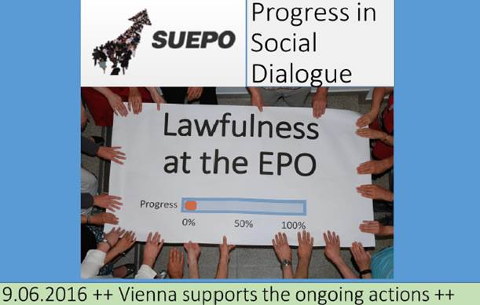
Summary: Battistelli’s EPO is having not only reputation problems but also staff retention problems, patent quality problems and problems pertaining to perception of fair trials or justice regarding patents
MULTI-BILLION or even small companies regularly pursue patents (e.g. granted by the EPO) in order to be able to follow a potebntially lengthy legal process and collect fees, unless an agreement is reached or settlement is arranged outside the courtroom (usually when there’s little doubt about the potency of the said patent/s). But what happens when the EPO itself stomps on its own staff (examiners) and spits at the face of legal processes? What happens when the examination process itself is dubious (likely to be discovered only at the court when astronomical fees are spent on prosecution lawyers)? These are very important questions that every single EPO worker must consider in light of decline in patent quality and demolition of the appeals process. Watch this morning’s tweet from the EPO. It gives the illusion of outside input being taken seriously (“Want to submit third-party observations? Our online form will help you do so concisely”). It would probably be a total waste of one’s time now that Battistelli rushes EPO examiners to just grant (lax/inexistent prior art searches) and crushes the appeal judges.
The circle of Battistelli, or Team Battistelli as we like to call it, is still attacking judges. What message does that send to stakeholders who process, prepare, submit and get granted patents? As this one comment put it today, “hope that the AC [Administrative Council] realises that thanks to its recent reforms it can now suspend the President” (he regularly breaks his own rules). Here is the full comment:
Let us hope that the AC realises that thanks to its recent reforms it can now suspend the President for up to two years pending an independent investigation into the reign of terror which he and his cronies have been conducting against EPO staff.
I am sure that they will take whatever action is necessary to restore order at the EPO.
Here is a response to an earlier comment:
“If next time they will be able to hold proceedings in public and hear the witnesses of the IU, there should be no reason why they will not be able issue a decision on the merit of the accusations.
…
Why do you think that their decision precludes another attempt by the AC – i.e., Battistelli?”
Do you seriously think that BB [Battistelli] is going to tolerate a public hearing and the questioning of witnesses which might expose the misdeeds of “his” investigative unit ?
Yes, as we noted here before, there seems to be an element of fabrication and/or exaggeration, just like in Laurent Prunier's case (SUEPO The Hague).
Here is another comment on this matter (Battistelli’s abuse of legal processes):
the whole of the introductory part might be interesting too
it reads (with one word omitted) in English: When, …, do you mean to cease abusing our patience? How long is that madness of yours still to mock us? When is there to be an end of that unbridled audacity of yours, swaggering about as it does now?
to whom might that apply ?
And from another thread we have this comparison to Juncker:
President Juncker has now officially stated that when Britain appoints a new Prime Minister they must invoke Article 50 within 24 hours if they are part of the ‘leave’ campaign, or 2 weeks if they are part of the ‘remain’ campaign.
I cannot find the legal basis for this in the EU Treaty. It is certainly not mentioned in Article 50. Can someone point to the legal basis for this demand?
There must be a legal basis, otherwise President Juncker is making up EU law himself, which is the act of a dictator.
What do the EPO employees who have suffered under the rule of Battistelli think of this?
The context of this is actually ‘Brexit’ — a subject that we shall tackle separately later.
“”Liberation” turns on Battistelli,” wrote another commenter about a new article whose translation we still hope to get from someone. Any volunteers? Sooner or later SUEPO itself might provide a translation, as most of the article is about SUEPO.
The EPO will sink or swim based on its reputation. At the moment Battistelli and his ‘bulldog’ are probably the top liabilities. One might get arrested, but the other needs to step down or get sacked. █
Permalink
 Send this to a friend
Send this to a friend






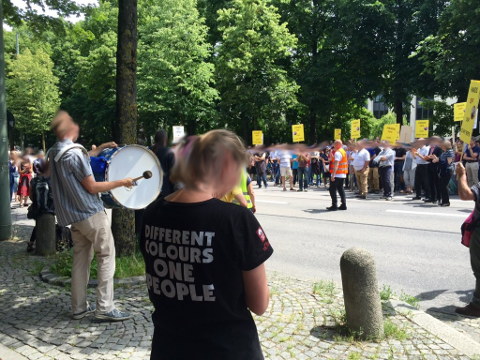
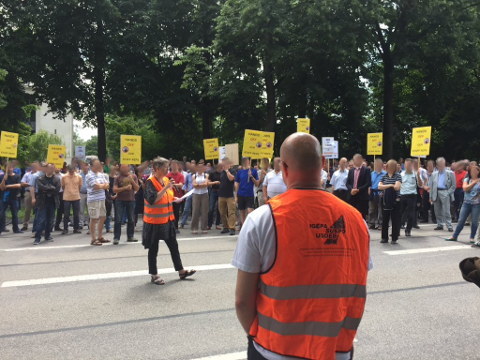


















 Content is available under CC-BY-SA
Content is available under CC-BY-SA